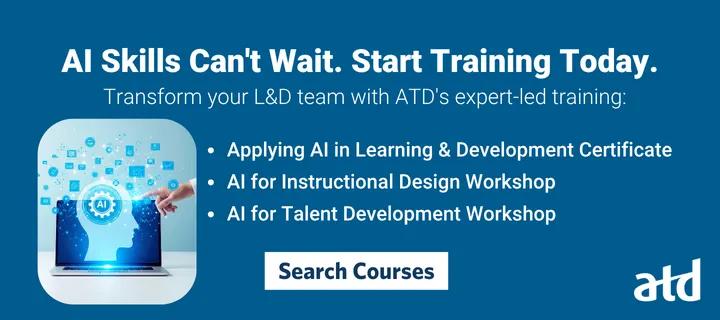ATD Blog
Crash Course in AI Agents and Talent Development
AI agents are still new, but they have the power to completely change how we learn and develop.
Thu Jan 09 2025

Forget everything you thought you knew about artificial intelligence (AI) in learning. We’re not just talking chatbots or personalized learning paths anymore. Get ready for AI agents, the next big thing in AI that’s about to seriously shake up L&D!
What Makes AI Agents Different?
Think of AI agents as super-smart digital assistants designed specifically for learning. They can:
Think for themselves: They set their own goals and figure out the best way to achieve them.
Work as a team: Imagine a bunch of AI agents collaborating to create the perfect training program, each with its own special skills.
Get stuff done: They don’t just talk the talk; they walk the walk! They can schedule meetings, whip up learning materials, give feedback, and even update your learning platform.
Why Agents are a HUGE Leap Forward From Simple Prompts
You might be thinking, “Wait, can’t I already do some of this with ChatGPT or other AI tools?” Yes, but here’s the key difference:
Prompts are like one-off commands: You tell the AI what to do, and it does it. Then you must give it another command, and another. It’s like constantly micromanaging someone.
Agents are proactive: They can figure out what needs to be done next, without you having to spell it out every step of the way. It’s like having a team of tireless assistants working behind the scenes 24/7!
Agents can learn and adapt: They get better over time, remembering past experiences and improving their performance. They’re constantly learning and refining their approach.
So, How Do You Know You’re Using an Agent?
Here are some tell-tale signs:
Continuous interaction: Instead of single prompts and responses, you’ll have an ongoing conversation with the AI agent. It’ll ask clarifying questions, offer suggestions, and proactively keep you in the loop.
Task completion: The AI agent won’t just generate text; it’ll take concrete actions like sending emails, scheduling meetings, or updating your learning platform.
Personalized experience: The AI agent will remember your preferences and past interactions, tailoring its responses and actions to your specific needs.
Permissions and Guardrails: Keeping AI Agents in Check (The Important Stuff!)
Just like giving a new employee access to company systems, you’ll need to grant permissions to AI agents. This might include:
Access to your learning platform: To update content, create learning paths, or track learner progress.
Communication tools: To send emails, schedule meetings, or interact with learners.
Data access: To analyze learner data, identify skills gaps, or personalize learning experiences.
But don’t worry, there are guardrails in place!
Role-based access control: You can limit what each agent can access and do based on its role.
Human oversight: You can review and approve actions taken by agents before they are executed.
Ethical guidelines: Developers are building AI agents with ethical considerations in mind, ensuring they are used fairly and responsibly.
Data security and privacy: Learner data is super sensitive. Think strong encryption, access controls, and compliance with regulations like GDPR and CCPA.
Bias detection and mitigation: We need to make sure these agents aren’t accidentally biased. Developers are working on ways to detect and fix biases in the algorithms.
Auditing and transparency: It’s important to be able to see what these agents are doing. Auditing tools help us track their actions and make sure they’re staying within the rules.
Can I Create an AI Agent?
Right now, creating truly sophisticated AI agents often requires some programming skills. You need to understand how to use tools like LangChain, connect to APIs, and maybe even write some code. But that’s changing fast! In the near future, we’ll see more user-friendly tools that allow anyone to create basic AI agents without needing to be a coder. Think of it like building a website—you don’t need to know HTML to use Wix or Squarespace.
How Can AI Agents Transform L&D? (The Good Stuff!)
Personalized learning on steroids: AI agents can create a learning journey that’s perfectly tailored to each person, changing the content, speed, and delivery in real time.
No more boring tasks: Say goodbye to creating quizzes and writing summaries! AI agents can do that for you, and even build entire courses.
Always-on support: AI agents can answer questions, help with problems, and give personalized feedback any time, day or night.
Less admin, more learning: Let AI agents handle the boring stuff like scheduling, tracking progress, and managing resources.
Real-World Use Cases (Let’s Get Specific!)
Your new hire buddy: Imagine a new sales hire. An AI agent could guide them through product demos, company policies, and even simulate sales calls, providing personalized feedback based on their performance. It could also proactively schedule meetings with key team members and track their progress against onboarding milestones.
Skills gap detective: An AI agent could analyze employee performance data and identify specific skill gaps within a team. It could then automatically recommend relevant training courses or create personalized learning plans to address those gaps.
Virtual mentor: Imagine an AI agent acting as a personal coach for a new manager, providing guidance on leadership skills, conflict resolution, and team management. It could offer personalized advice based on the manager’s specific challenges and goals.
Who’s Building These Amazing Agents? (The Big Players)
Big names like Google, Microsoft, and Amazon are all working on AI agents. They’re creating the tools and platforms that will power this new wave of AI. Think of tools like LangChain (which helps connect language models to other tools), AutoGPT, and BabyAGI (which explore autonomous agent behavior)—these are like the building blocks for creating smart and helpful AI agents.
The Evolving Role of L&D Professionals
AI agents will free up L&D pros from tedious admin tasks, allowing them to focus on higher-level strategic work like curriculum design, needs analysis, and fostering a culture of learning. They’ll become curators and orchestrators of learning experiences, leveraging AI as a powerful tool. So, no, AI isn’t coming for your job, it’s coming to make your job way more interesting!
What L&D Professionals Need to Know (The Important Questions)
Data privacy and security: How will AI agents handle sensitive learner data?
Integration with existing systems: Can AI agents work with your current learning platforms and tools?
Ethical considerations: How do we ensure AI agents are used fairly and don’t create bias?
The human element: What role will human L&D professionals play in an AI-powered world?
Challenges and Limitations (Keeping it Real)
Hallucinations: Sometimes, these AI models can confidently generate completely made-up information. It’s something developers are working hard to fix.
Context is key: Getting AI to truly understand the nuances of human communication is tough. They’re getting better, but they’re not perfect yet.
Power hungry: Running these sophisticated agents takes a lot of computing power.
What’s Next in the Near Future? (The Exciting Part!)
Better teamwork: AI agents will get even better at working together to solve complex problems.
More human-like interaction: Talking to an AI agent will feel more natural and conversational.
Ethical and responsible AI: We’ll focus on making sure AI agents are used fairly and responsibly.
The Future Is Agentic
AI agents are still new, but they have the power to completely change how we learn and develop. By using this technology, we can create learning experiences that are more efficient, effective, and engaging for everyone.

